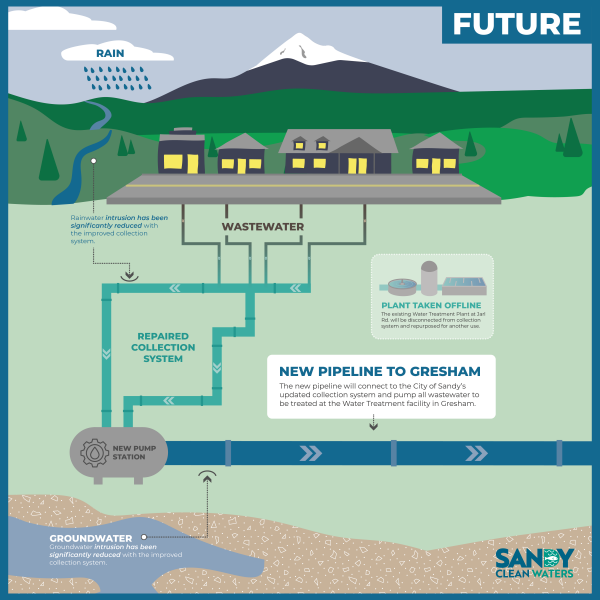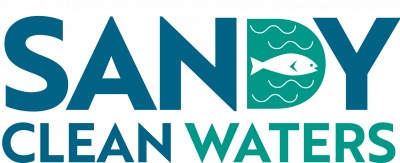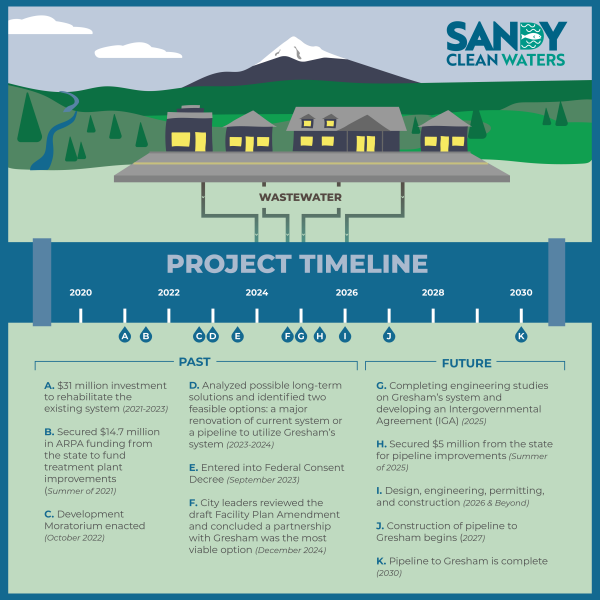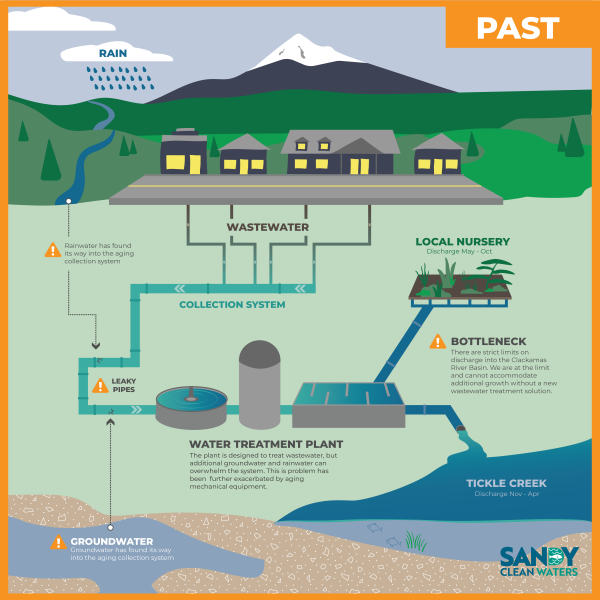Sandy Clean Waters
No one wants to deal with wastewater until you can’t ignore the stink.
The City of Sandy is moving forward with a comprehensive approach for how we handle our wastewater. Interim fixes have put off this decision, but further delay is not an option under a federal consent decree, especially with the escalating impact of our system’s problems on local residents and businesses.
The approach will come with a substantial cost to ratepayers. But the cost of inaction would be more, as the City would accrue additional fines and the cost of construction is rising rapidly. The City is committed to explaining how we arrived at this responsible approach and is also looking for ways to reduce the costs to ratepayers.
HOW WE GOT HERE
In the 1970s, the state capped how much wastewater can be discharged into the Clackamas River basin in order to preserve water quality. This means even though our community makes up a tiny portion of those that live in that basin, we have strict limits on how much treated wastewater we can put in it. Since then, as we have grown, the City has used a number of strategies to handle our increased wastewater. That includes upgrades to our wastewater treatment plant and an innovative partnership to provide recycled water to a local nursery. But these are limited solutions and about a decade ago the U.S. Environmental Protection Agency and Oregon Department of Environmental Quality began finding the City out of compliance with the federal Clean Water Act. Under the federal Consent Decree, we are required to implement a permanent solution and are limited in issuing new land use permits for housing and businesses until we do.
WHAT OPTIONS WERE CONSIDERED?
After extended review with all choices on the table, the City settled on two viable options:
- a major renovation of our wastewater plant and adding a new pipeline to discharge treated water into the Sandy River, or
- build a pipeline to pump wastewater to the City of Gresham for treatment.
The cost of both options was similar, but the City concluded a partnership with Gresham was the better solution. That is because:
- It is the best way to ensure we remain in legal compliance in the future, avoiding fines that will increase costs for ratepayers.
- It gets Sandy out of the treatment business, as we will no longer have to maintain and operate the system, and lets us share the cost of wastewater infrastructure with other communities across the region including Fairview and Wood Village that also are served by Gresham.
- It will eliminate the risk of restrictions that would prevent residents and businesses from obtaining new land use permits.
- Gresham’s proximity to other waterways ensures it will be able discharge treated wastewater even as our region grows.
The City is currently completing engineering studies on the capacity of Gresham’s system, with the goal of having an Intergovernmental Agreement (IGA) in place by the end of 2025.

WHAT WILL IT COST?
If the City is not able to secure outside funding, ratepayers will see significant increases on their bills. These increases could be 10-14% a year for the next eight years. The overall cost of these projects is over $200 million. In 2025 we secured $5 million from the Oregon Legislature to support these projects, which will help us reduce the cost to future ratepayers. In addition, the city will use fees (SDCs) to ensure new developments pay for themselves. We recognize that this will be hard for the community, particularly given other recent increases. Unfortunately, this is the only way to effectively address this challenge in the long term and provide a pathway to rate increase relief once we have made the transition.
WHAT'S NEXT?
Building out the needed infrastructure and transitioning wastewater treatment to Gresham will take several years. We will also continue to make improvements to our wastewater collection system during that time. The City is working to lessen the impact on ratepayers by securing state and federal funding, as well as negotiating favorable connection fees with the City of Gresham. We are also working to educate the community about how to preserve our wastewater system and reduce the impact of what we all pour down the drain. During this time, the City is committed to having an open and transparent conversation with the community about why this is the path we’ve chosen and our progress along the way.
STAY UP TO DATE WITH SANDY CLEAN WATERS
The City will be providing regular updates to residents on the progress of this work. To stay up to date on the latest news and project milestones, sign up for project updates here. You can also provide comments or questions here.



